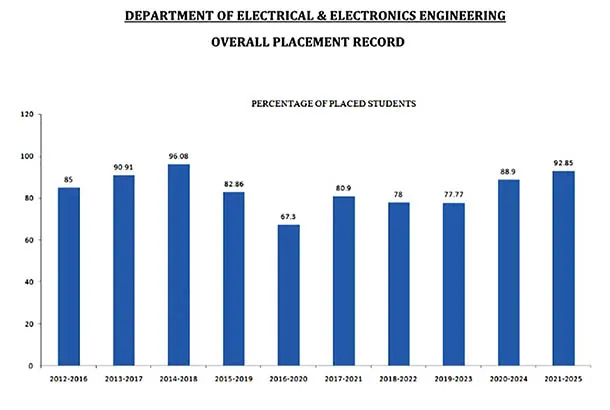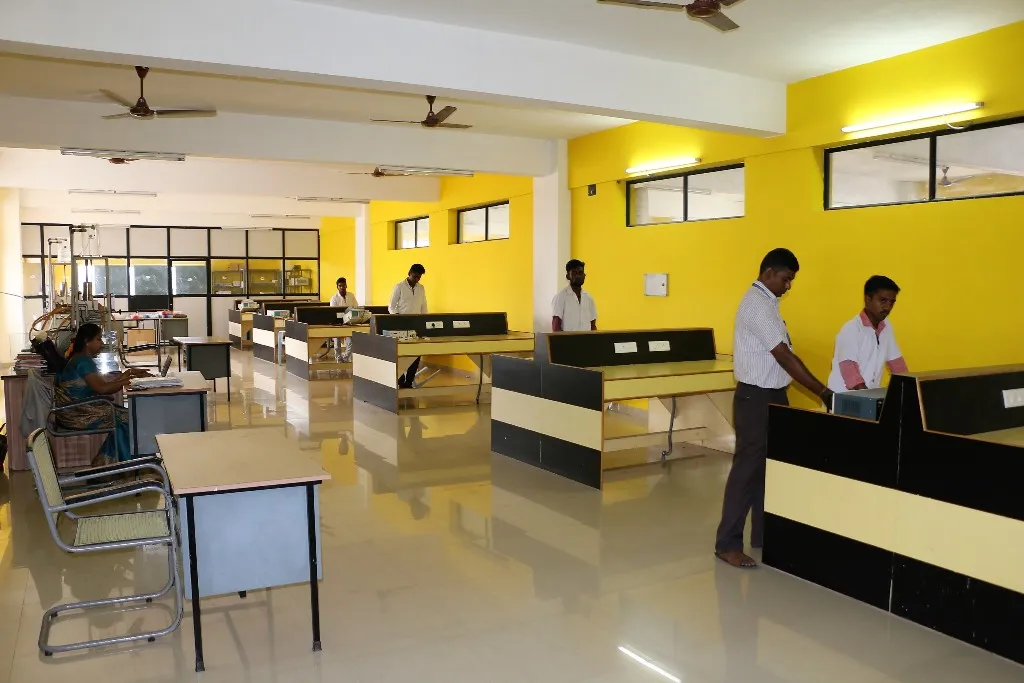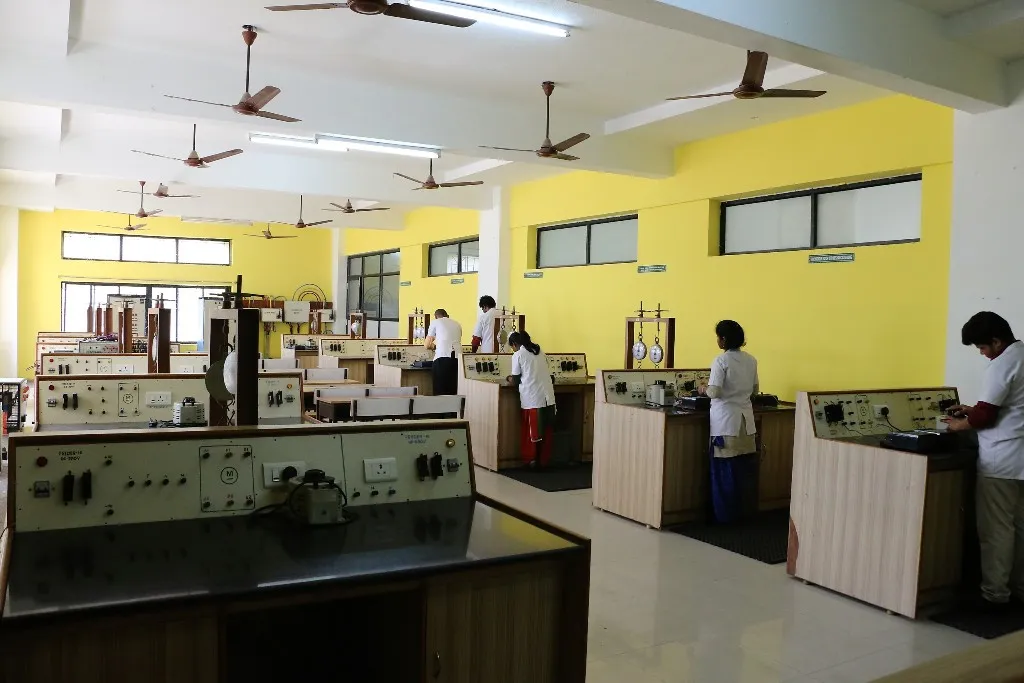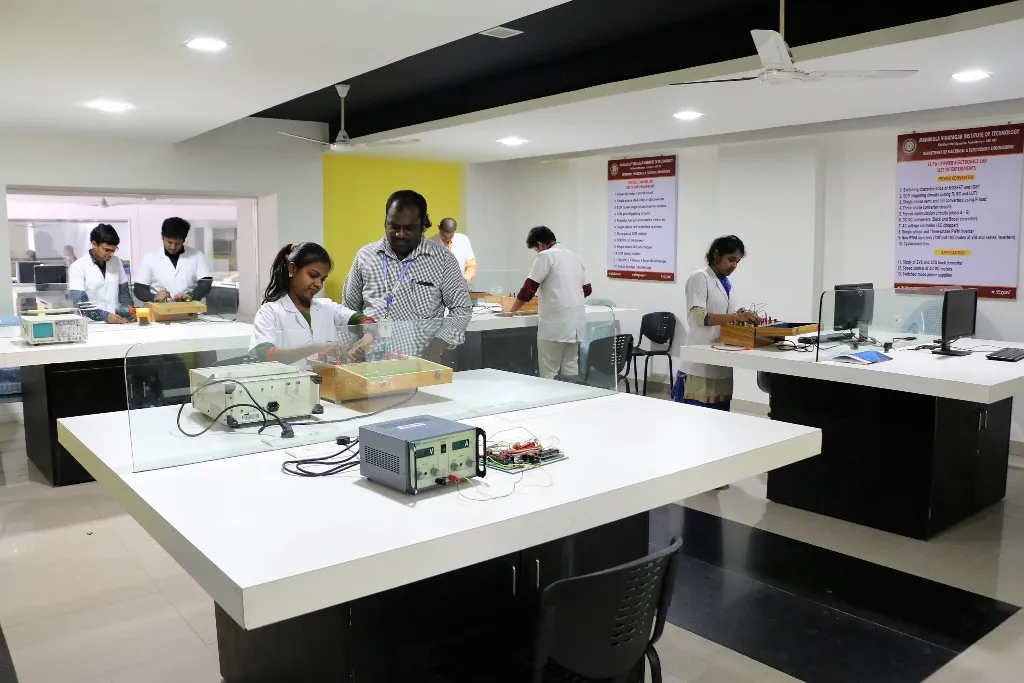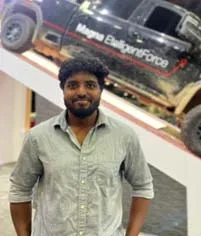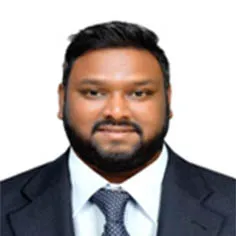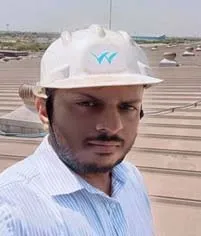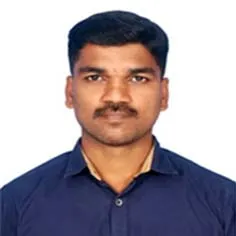
The Department of Electrical and Electronics Engineering
About the Department
The Department of Electrical and Electronics Engineering (EEE) commenced its journey in 2008 with an initial intake of 60 students at Under Graduate Level. Our college secured an impressive NAAC A grade in the year 2022. This achievement underscores our commitment to academic excellence and quality education.
The department specializes in imparting technical expertise encompassing Electrical Vehicle, Industrial Automation, Electrical Machine analysis software and their practical applications. Recognizing the nation’s vision for advancing the electrical manufacturing industry, we offer diverse training modules to foster the development of industry-ready engineers. Our focus remains on nurturing student competencies through multifaceted activities.
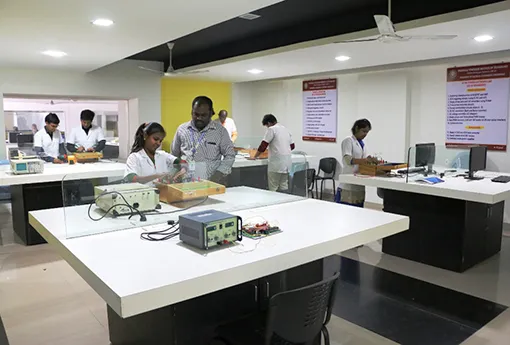
Equipped with cutting-edge facilities, including Electrical Machines labs, microprocessor and microcontroller labs, Power Electronics labs and Electronics devices labs, and Power system simulation labs, our department ensures a conducive learning environment. Regular revisions of course curricula and laboratory setups ensure alignment with the latest technological advancements.
Further enhancing our academic resources, the Department maintains a dedicated library stocked with the latest titles, editions, journals, magazines, and internet connectivity. Organizing seminars, workshops, and guest lecturers is a regular practice aimed at augmenting the technical prowess of our students, preparing them for global competition. Additionally, collaborations through MoUs with esteemed entities like Voltech Energy India Pvt Ltd, Touch Energy Technologies, LED GEO Lights Pvt.Ltd, Axis Global Automation and Space Zee Technologies Private Limited enrich our curriculum with industry-oriented knowledge.
Department Vision and Mission
Vision
To create comprehensive electrical engineers to meet up the growing technological demands of the society.
Mission
Higher Order Thinking: To impart high quality education to help the students hone their professional skills.
Competency: To improve the competencies of students and faculties on contemporary technologies through continuous improvement programs.
Continuous learning: To undertake research on frontier areas of electrical and electronics engineering
Entrepreneurship: To imbibe the spirit of innovation and entrepreneurship among the students.
Programme Educational Objectives (PEOs)
PEO1: Employability:
Graduates will have the ability to demonstrate skills in developing innovative ideas, and in providing effective solutions to complex engineering problems thereby being productive and participative global citizens.
PEO2:Higher Education:
Higher Education Our graduates will have the ability and confidence to pursue higher education orexhibit professionalism in the career or take up entrepreneurial accomplishments.
PEO3:
Entrepreneurship:
To Our graduates will have the technical competency to involve in multidisciplinary research within the suitable technological, global, societal, ethical, economical, environmental and organizational context..
PEO4:Ethical:
Our graduates will engage themselves in life-long learning thereby keeping themselvesabreast of the contemporary issues.
Programme Outcomes (PO)
PO1: Engineering knowledge: Apply the knowledge of mathematics, science, engineering fundamentals, and an engineering specialization to the solution of complex engineering problems.
PO2: Problem analysis: Identify, formulate, review research literature, and analyze complex engineering problems reaching substantiated conclusions using first principles of mathematics, natural sciences, and engineering sciences.
PO3: Design/development of solutions: Design solutions for complex engineering problems and design system components or processes that meet the specified needs with appropriate consideration for the public health and safety, and the cultural, societal and environmental considerations.
PO4: Conduct investigations of complex problems: Use research-based knowledge and research methods including design of experiments, analysis and interpretation of data, and synthesis of the information to provide valid conclusions.
PO5: Modern tool usage: Create, select, and apply appropriate techniques, resources, and modern engineering and IT tools including prediction and modeling to complex engineering activities with an understanding of the limitations.
PO6: The engineer and society: Apply reasoning informed by the contextual knowledge to assess societal, health, safety, legal and cultural issues and the consequent responsibilities relevant to the professional engineering practice.
PO7: Environment and sustainability: Understand the impact of the professional engineering solutions in societal and environmental contexts, and demonstrate the knowledge of, and need for sustainable development.
PO8: Ethics: Apply ethical principles and commit to professional ethics and responsibilities and norms of the engineering practice.
PO9: Individual and team work: Function effectively as an individual, and as a member or leader in diverse teams, and in multidisciplinary settings.
PO10: Communication:Communicate effectively on complex engineering activities with the engineering community and with society at large, such as, being able to comprehend and write effective reports and design documentation, make effective presentations, and give and receive clear instructions.
PO11: Project management and finance: Demonstrate knowledge and understanding of the engineering and management principles and apply these to one’s own work, as a member and leader in a team, to manage projects and in multidisciplinary environments.
PO12: Life-long learning: Recognize the need for, and have the preparation and ability to engage in independent and life-long learning in the broadest context of technological change.
Programme Specific Outcome (PSO)
PSO1: Products Development: An ability to design, analysis and to implement power electronicsconverters in renewable energy applications.
PSO2: Design Thinking: A capability to design and examine the power system and to solve the unitcommitment with various constraints.
Welcome Message
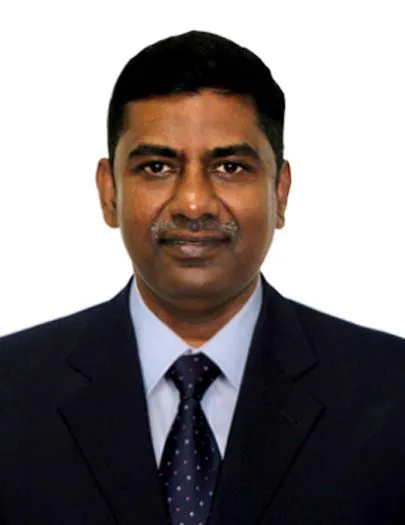
Dr.C.SHANMUGASUNDARAM
The Department of Electrical and Electronics Engineering (EEE) commenced its journey in 2008 with an initial intake of 60 students at Under Graduate Level. Our college secured an impressive NAAC A grade in the year 2022. This achievement underscores our commitment to academic excellence and quality education.
The department specializes in imparting technical expertise encompassing Electrical Vehicle, Industrial Automation, Electrical Machine analysis software and their practical applications. Recognizing the nation’s vision for advancing the electrical manufacturing industry, we offer diverse training modules to foster the development of industry-ready engineers. Our focus remains on nurturing student competencies through multifaceted activities.
Equipped with cutting-edge facilities, including Electrical Machines labs, microprocessor and microcontroller labs, Power Electronics labs and Electronics devices labs, and Power system simulation labs, our department ensures a conducive learning environment. Regular revisions of course curricula and laboratory setups ensure alignment with the latest technological advancements.
Further enhancing our academic resources, the Department maintains a dedicated library stocked with the latest titles, editions, journals, magazines, and internet connectivity. Organizing seminars, workshops, and guest lecturers is a regular practice aimed at augmenting the technical prowess of our students, preparing them for global competition. Additionally, collaborations through MoUs with esteemed entities like Voltech Energy India Pvt Ltd, Touch Energy Technologies, LED GEO Lights Pvt.Ltd, Axis Global Automation and Space Zee Technologies Private Limited enrich our curriculum with industry-oriented knowledge.
Programs
Department of Electrical and Electronics Engineering
The Department of Electrical and Electronics Engineering at Manakula Vinayagar Institute of Technology
offers a B.Tech in Electrical and Electronics Engineering emphasizing innovative Power Systems and Power
Electronics in Renewable Energy solutions.
Placements
We are pleased to present our students who have gained positions with top recruiting firms, demonstrating their talent and the high level of education and training they get in our department. Our extensive industry connections and comprehensive placement help ensure our alums have successful careers with top companies.
Batch Wise Placement Statistics (click below to view pdf )
2020-2024, 2019-2023, 2018-2022, 2017-2021, 2016-2020, 2015-2019, 2014-2018, 2013-2017, 2012-2016, 2011-2015, 2010-2014, 2009-2013, 2008-2012Achievements
Faculty
The Electrical and Electronics Engineering (EEE) department has a faculty of bright minds who incorporate interdisciplinary and innovative approaches into the curriculum. They teach undergraduate students, conduct research programs, and organize seminars, symposiums, national level conferences, guest lectures, and workshops. The faculty members also receive grants from various professional societies and use them to modernize the labs in the department and conduct rural development programs.
Events
CoCurricular events
Program Outcome Attainment
Course Outcome
Major Events
Department of Electrical &Electronics Engineering (EV&RE GROUP) isorganizingGuest Lecture on “APPLICATION OF AI IN ELECTRICAL ENGINEERING” for IV year EEE. This programme is going to delivered by Mr.D.Muruganandhan AP/EEE during 4th week of Jan 2025.
Department of Electrical &Electronics Engineering (EV&RE GROUP) is organizing orientation programme on “FROM CAMPUS TO CORPORATE: PREPARING EEE STUDENTS FOR SUCCESS” for III year EEE. This programme is going to delivered by Dr.C.Shanmugasundaram Prof/EEE/ Mr.D.Balaji, AP/EEE/Mr. N.Amarabalan, AP/EEE, Mr.D.Muruganandhan AP/EEE, Mrs.R.Muthunagai, AP/EEE during 3th week of Jan 2025.
Department of Electrical &Electronics Engineering (EV&RE GROUP) isorganizingintellectual property rights program on “DESIGN RIGHTS FOR EEE INNOVATIONS” for IV year EEE. This programme is going to delivered by Mr.Jayakumar Pattern Officer MVIT/Mr.D.Balaji AP/EEE during 3th week of Jan 2025.
Department of Electrical &Electronics Engineering (PE&PS GROUP) is organizing added courses on “AI-DRIVEN PREDICTIVE MAINTENANCE IN ELECTRICAL ENGINEERING APPLICATIONS” for III year EEE. This programme is going to delivered by Mr. J. VijayaRaghavan AP/EEE during 2th week of feb 2025.
Department of Electrical &Electronics Engineering (PE&PS GROUP) is organizing internal / external workshop on “Advanced MATLAB Techniques for Electrical Engineering Applications” for III year EEE. This programme is going to delivered by Dr.K.Sedhuraman, ASP/EEE during 4th week of feb 2025.
Department of Electrical &Electronics Engineering (EV&RE GROUP) is organizing an internal/external workshop on “MATLAB Simulink for Renewable Energy Applications” for III year EEE. This programme is going to be delivered by Mr. D. Muruganandhan, AP/EEE during the 1st week of Feb 2025.
MoU
Infrastructure
The department provides extensive computing resources for research and education. The department has wireless internet connectivity via a campus-wide 802.11b network to the laptops.
Alumni
Mr. Elanchetchenni.A
Position: 2014-2018
Power electronics design engineer
Magna Power train of America, Inc., Troy, Michigan, USA
Mr. Elanchetchenni.A
2014-2018
Power electronics design engineer
Magna Power train of America, Inc., Troy, Michigan, USA
Mr. K.Pradhap
2010-2014
Haier Appliances India pvt Ltd
Regional Training Manager, Chennai
Mr. Naickar Nilesh Tamilmani
Position: 2009-2013
Associate Manager - Electrical and Automation
Welspun Corp Limited, Anjar
Mr. Naickar Nilesh Tamilmani
2009-2013
Associate Manager - Electrical and Automation
Welspun Corp Limited, Anjar
Mr. Sashilan.M
2008-2012
Manufacturing Specialist
GE T&D INDIA LTD, Pallavaram, Chennai.
BoS

If you have any inquiries regarding the department, please feel free to reach out to us. We are here to assist you with any questions or information you may need.
Dr. C. SHANMUGA SUNDARAM, Professor & Head,
Department of Electrical and Electronics Engineering

